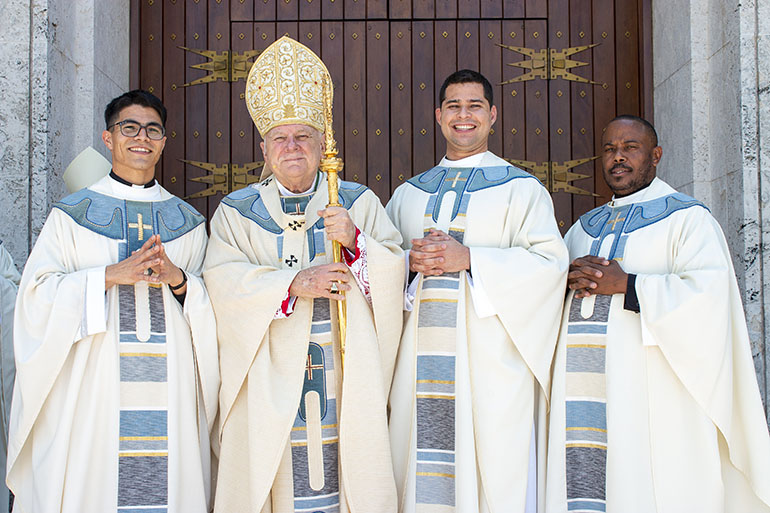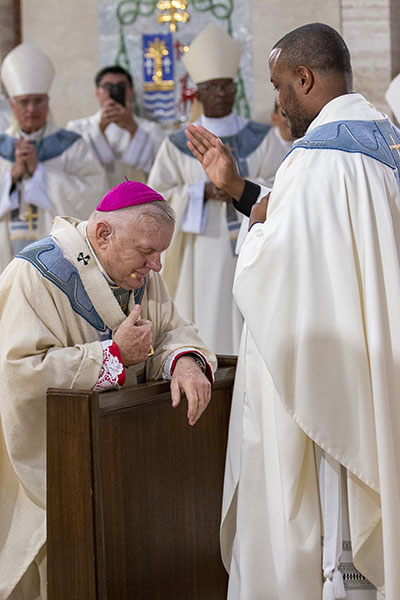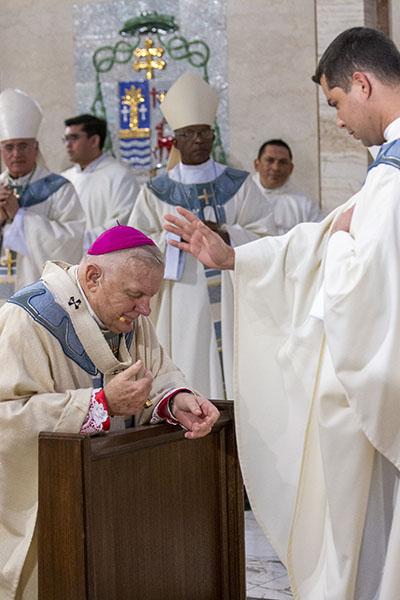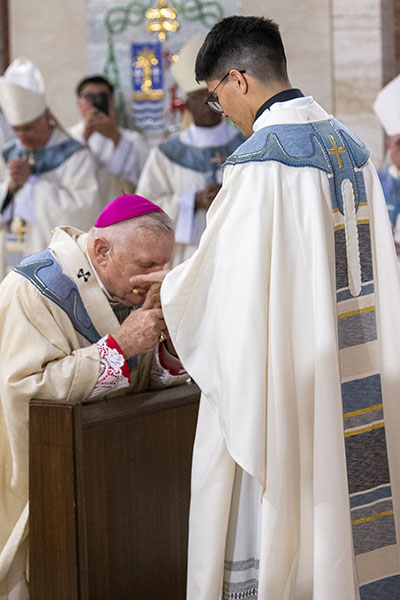By Archbishop Thomas Wenski - The Archdiocese of Miami

Photographer: ANA RODRIGUEZ-SOTO | FC
Posing outside St. Mary Cathedral for their official photos with Archbishop Thomas Wenski, from left, are newly ordained Fathers Agustin Estrada, Enzo Prendes and Cesar Betancourt, May 7, 2022.
Archbishop Thomas Wenski preached this homily at the ordination Mass for three new archdiocesan priests, celebrated May 7, 2022 at St. Mary Cathedral in Miami.
Cesar, Agustin, Enzo:
Just as Jesus was sent by the Father and he in turn sent the Apostles into the world, the three of you, by your ordination to the sacred priesthood, are sent to preach the Gospel, sustain God’s people, and celebrate the liturgy, above all, the Lord’s sacrifice.

Photographer: ANA RODRIGUEZ-SOTO | FC
Archbishop Thomas Wenski gets a blessing from newly ordained Father Cesar Betancourt at the conclusion of the ordination Mass, May 7, 2022 at St. Mary Cathedral.

Photographer: ANA RODRIGUEZ-SOTO | FC
Archbishop Thomas Wenski gets a blessing from newly ordained Father Enzo Prendes at the conclusion of the ordination Mass, May 7, 2022 at St. Mary Cathedral.

Photographer: ANA RODRIGUEZ-SOTO | FC
Archbishop Thomas Wenski gets a blessing from newly ordained Father Agustin Estrada at the conclusion of the ordination Mass, May 7, 2022 at St. Mary Cathedral.
Yo, al igual que toda la Iglesia, les damos las gracias a ustedes por haber dicho “Sí” a este llamado al sacerdocio de Jesucristo. También estamos agradecidos a todos los que los han ayudado a discernir este llamado y a responder generosamente – a sus padres, sus familiares, amigos, y a los sacerdotes que los han animado.
Una palabra a los padres y a las familias de estos hombres: La Iglesia está muy agradecida a ustedes por su generosidad, por haberlos animado para que pudieran responder a esta vocación sacerdotal en la cual servirán a Cristo, maestro, sacerdote y pastor. Y no se preocupen por sus hijos: las oraciones y la amistad de sus nuevos hermanos sacerdotes les van a servir de amparo.
¿A qué han respondido “Sí”? ¿Qué significa “ser un sacerdote de Jesucristo? En la Segunda Plegaria Eucarística, siguiendo la consagración, el sacerdote celebrante reza: “Te damos gracias porque nos haces dignos de servirte en tu presencia.” Estas palabras, tomadas de un texto del Antiguo Testamento, describen la esencia de nuestro ministerio sacerdotal: estamos frente a la presencia del Señor para servirle.
Diariamente estamos llamados a estar ante su presencia celebrando la Eucaristía. Nuestra vida entera, entonces, debe estar ante su presencia. Debemos fijar nuestra mirada en Él y estar ahí para Él. Esto quiere decir que la oración debe ser una realidad primordial en sus vidas para que la celebración de la Misa o de los Sacramentos sea un reflejo de su propia participación interior.
Estar en presencia del Señor también debe implicar siempre, en lo más profundo, hacerse cargo de los hombres ante el Señor que, a su vez, se hace cargo de todos nosotros ante el Padre. Y debe ser hacerse cargo de él, de Cristo, de su palabra, de su verdad, de su amor. Estamos ante el Señor, pero también estamos para Él; pues no son nuestras palabras o nuestras personas lo que predicamos sino la palabra de Cristo, la persona de Cristo.
Jesús rezó en la Jardín de Getsemaní: “Señor, hágase tu voluntad y no la mía.” Prometen obediencia al obispo. De manera real, esta promesa les provee la libertad de ser en verdad hombres para los demás; esta promesa les permite entrar en la voluntad de Dios, en el plan de Dios, y al ofrecer testimonio de que lo que creen, enseñan o hablan, lo hacen en comunión con la Iglesia Católica y Apostólica.
A priestly vocation, in the words of the Pope St. John Paul II, is both a “gift and a mystery.” To embrace the gift and to enter into the mystery which enables the priest, in communion with Jesus to act in his name and in his sight, as a shepherd of souls, is a step not to be taken lightly.
But as Pope Benedict once told a group of priests he ordained “... may the certainty that Christ does not abandon us, and that no obstacle can prevent the accomplishment of his universal plan of salvation be a cause of constant consolation and a steadfast hope in you even in difficulties. The Lord’s goodness is always with you, and it is powerful.”
Nevertheless, the demands of the ministry with its inevitable trials and disappointments and the fact that we carry the “treasure” of the Gospel in “earthen vessels” can sometimes tempt us priests to give into discouragement — and, perhaps, sometimes even to try the patience of our people.
Priests, of course, forgive sins in the name of Christ and his Church. I asked these new priests to be generous with their time making themselves readily available to hear the confessions of the people.
At the same time, I encouraged them not to neglect to avail themselves of the consolations of the Sacrament of Penance. For frequent confession will keep you humbly aware of your unworthiness and will also constantly remind you of the primacy of grace: God uses imperfect instruments to work his will so that we will know that He saves not we. And the Mercy of God will always be greater than yours or our own weakness and unworthiness.
A priest, Pope Francis tells us, is not to build walls but bridges. And he has challenged all of us to “go out of the sacristies and go out to the ‘outskirts’ where people of faith are most exposed to the onslaught of those who want to tear down their faith.” Pope Francis reminds us that the priestly anointing we receive is not meant to just make us fragrant; rather, it is meant “for the poor, the prisoners, the sick, for those sorrowing and alone.”
Our society is confronted by a disturbing loss of the sense of the transcendent and the affirmation of a culture of the material and the ephemeral. Our world, increasingly organized as if God does not matter, desperately needs the priest’s witness of hope: a priest’s witness that God does matter is made more compelling by his detachment from material comforts and signs of status, by his readiness to obediently be available wherever the bishop may send him, and by his chaste celibacy which is the source of spiritual fecundity. So that you may lead the world to the knowledge of Jesus Christ, the hope that does not disappoint, as you celebrate the Sacraments, strive to understand what you do and imitate what you celebrate, attending not to your own concerns but to those of Jesus Christ.
This is what Pope Francis would call being a priest who goes out of himself and lives like a shepherd with the “odor of the sheep.”
Since the priest offers the Holy Sacrifice every day, sacrifice must also be the condition of your lives. In giving Christ’s Body and Blood, we priests must also give our body and blood for the life of our people.
The ordination of these three men inspires great joy among all the people of this archdiocese — even as we pray God to send us more laborers for this vineyard, for the harvest is great — and the laborers are few.

